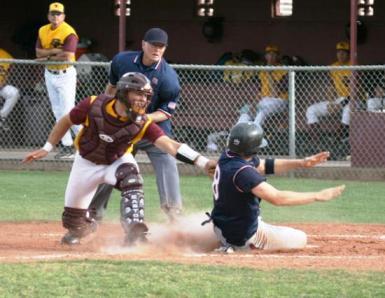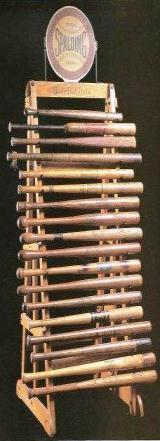Technically, isn't the batter out?
by Brian
(Ham Lake, MN)

Brian from Ham Lake, Mn submitted this question last week. In answering the question, I accidentally deleted it from the system.
I am resubmitting it myself, in the hope that Brian will see it and receive his answer. It is a great question!
Brian asked: During a recent game of 13 yr old boy's baseball, runners were on 1st and 2nd, pitcher pitched a ball, making the count 3-1.
Batter took off for first base and the runners on 1st and 2nd walked ( advanced to second and third ). The umpire called the batter/runner back to the plate and let the other runners stay.
Umpire wasn't keeping the count out loud.
Technically, isn't the batter out, as soon as he tried to leave for first base, and since the umpire wasn't keeping the count out loud, shouldn't he have made the runners go back to the bases they started at?
Rick Answered: This one must have gotten exciting!
The umpire isn't required to keep the count out loud, although it is a help for younger players.
If the umpire knew the count, he could have stopped the batter right away; but didn't.
What happened next is the batter delayed the game, by failing to be ready within the 20 seconds after the ball was returned to the pitcher.
The penalty for that is a called strike. Since the count was 3-1, it becomes 3-2. All of this takes place on a live ball.
Since the ball is live, the base runners are able to try and advance. At this point the defense missed a terrific opportunity. Since the runners were walking, the defense could have thrown to 3B and tagged that runner, and possibly had enough time to throw to 2B and complete a double play.
Depending on the number of outs at the time they could have been out of the inning, and the batter would be leading off the next time they came to bat.
Since the defense apparently lost the count also, both runners are safe and the batter returns to home plate with the count 3-2.
This is one of those special teaching moments that make the game of baseball so special.
It is one of baseball's unwritten rules or axioms, never lose track of the count or the number of outs.
The written rule covering this situation is: 7-3-1 Section 3.
Batting Infractions ~ A batter shall not:
Art 1. . .Delay the game by failing to take his position promptly in the batter's box within 20 seconds.
*There are 8 exceptions, none of which apply in this example.
Penalty: For failure of the batter to be ready within 20 seconds, after the ball has been returned to the pitcher, the umpire shall call a strike. If the batter leaves the batter's box, delays the game none of the exceptions apply, the plate umpire shall charge a strike to the batter. The pitcher need not pitch and the ball remains live.
These are some of the internal workings of a baseball game that mostly go unnoticed by the spectators, some of which lead to the observation that baseball is boring.
Not so if you are playing, or watching with a look inside of the situation. Much is going on, it just isn't all physical movement.
"The theory of baseball is as simple as that of any other sport in vogue, and herein lies one of it's attractive features; and yet, to play the game up to it's highest point of excellence requires as great a degree of mental ability...as any known game of ball." ( from The Game of Baseball by Henry chadwick, 1868.)
It was true then, and it is still true today, baseball is an easy game to play; but a hard game to master!
Yours in baseball,
Rick
Click here to post comments
Join in and write your own page! It's easy to do. How? Simply click here to return to Ask The Baseball Coach.
|





